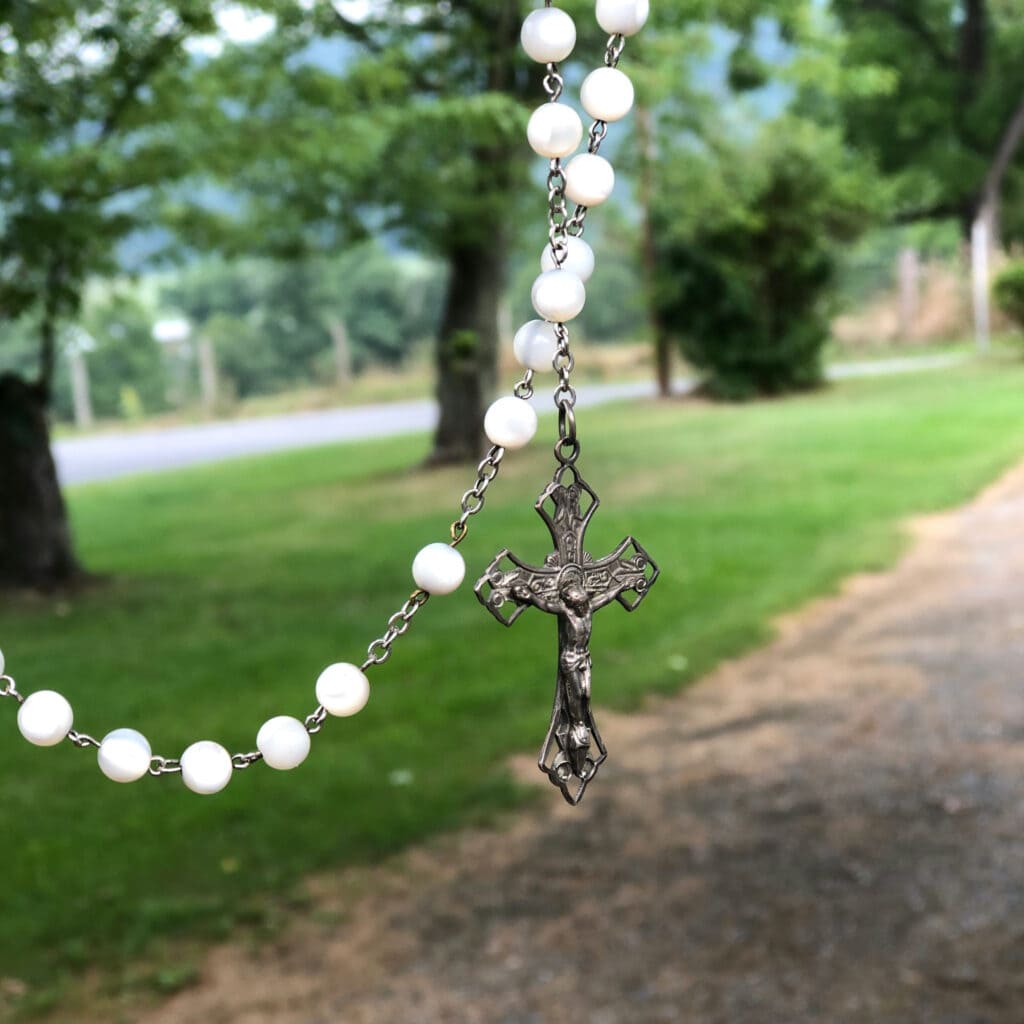
It’s easy to go to church every Sunday and then get so caught up daily life that the beauty and richness of the faith takes a back seat. But our family and day to day life are so important in building our foundation of living out the Gospel. In fact, so meaningful, that the Catholic Church calls the family the “Domestic Church” in the Catechism of the Catholic Church. This entrustment, encourages parents in the authority and responsibility to show their children how the faith is lived out. In this post, I will share 10 ways to bring the Catholic faith into our homes and families, to live the faith more fully in ordinary life.
1656 In our own time, in a world often alien and even hostile to faith, believing families are of primary importance as centers of living, radiant faith. For this reason the Second Vatican Council, using an ancient expression, calls the family the Ecclesia domestica. 168 It is in the bosom of the family that parents are “by word and example . . . the first heralds of the faith with regard to their children. They should encourage them in the vocation which is proper to each child, fostering with special care any religious vocation.” 169
Catechism of the Catholic Church
We have particular authority to raise our children in the faith because as the Church states, we, the parents, are “by word and example.. the first heralds of the faith to our children”. Bringing our children to church every Sunday is essential. So are religious education classes, when children are old enough.
But faith should be a part of our weekdays as well, not just on Sundays.
1. Live & show the faith to your children.
We should take every opportunity that we can to show our children the faith.
This doesn’t mean “make them” or “shove it on them” in a negative way.
Unfortunately, I think the people who leave the faith as adults do so because of two reasons.
The first, the teaching of the faith was shallow and highly misunderstood.
Or the second, that the faith was pushed on them too much and in a negative way as children.
This means, as parents we need to have a full and meaningful understanding of the faith as adults. That way we can articulate the faith well to our children. We need to be rooted in what we believe as Catholic Christians.
Also, it means the biggest way to show the faith to our children is for our own love for Jesus to be so ingrained in ourselves, that our children see and know Jesus through our love and actions.
Be the Christian Example in the world first and foremost. Our children are watching and learning from us through every thing that we do.
2. Be involved in a church ministry and make sure your children see you doing it.
Make this a part of your family life and mission. If your children are old enough and it’s appropriate for them (and your church okays it) take your children with you. Examples could be a food pantry at your church or even out with a street evangelization team as a family. Children need to see us be the hands and feet of Jesus in this world.
Some ministries that are still very important to your family’s personal mission are not suitable for children to attend, for example a church prison ministry. In this case, when the children are at an appropriate age of understanding, just be vocal to them about where you are going and why it’s so important.
3. Get a small Holy Water font for your home to keep near your door.
Did you know that you can bring Holy Water home from church? Some Catholic Churches, where this practice is common, have a large container that you can fill from either in the sanctuary or the vestibule. You can purchase a small holy water bottle (like this Holy Water bottle) to transport it home in. If your church doesn’t have this, you can ask your Parish Priest.
As Catholic parents, we have the authority to bless our children with holy water. This article by the United States Conference of Catholic Bishops shows how to do this simply and gives a few examples of things to pray over your child in blessing.
You can choose to bless your children nightly, and/or anytime your child leaves the house. But anytime is appropriate, really.
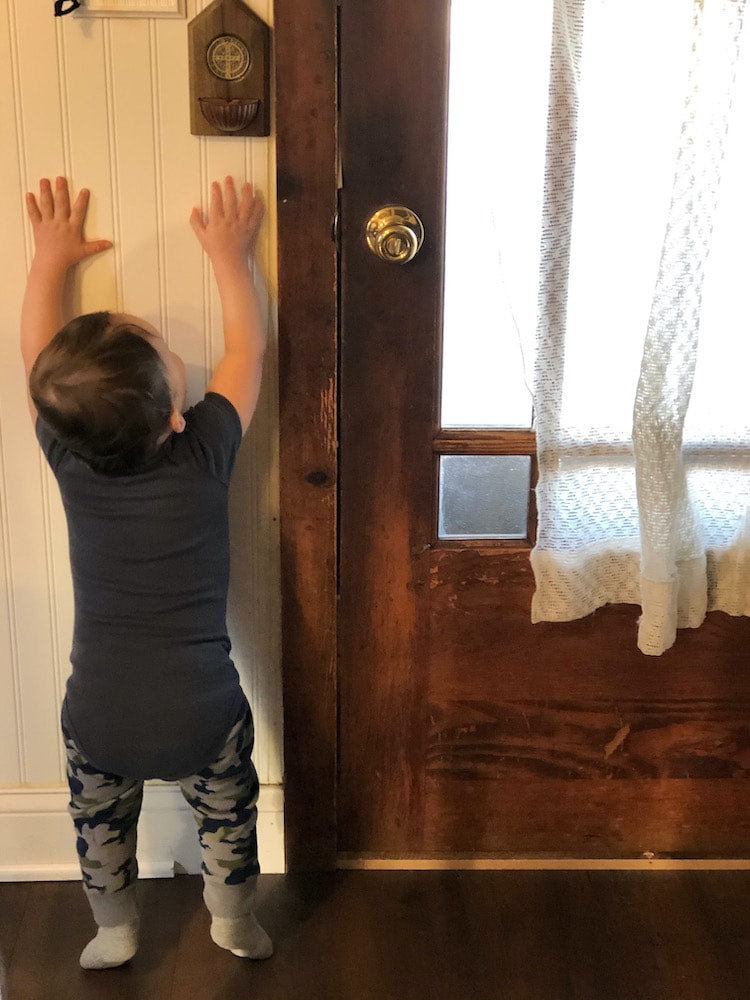
This article by Aleteia explains a lot more in-depth on how to bless your children and includes some references to Old Testament Biblical blessings, too.
If you don’t know much about Holy Water, this video by The Catholic Talk Show explains 7 Things You Didn’t Know About Holy Water. It is another in-depth reference if you are interested.
4. Hang your palms from Palm Sunday.
Palms are a sacramental that are given out at the Palm Sunday Mass. Place the palms in a prominent place in your home, like around a religious art piece.
This post by Blessed is She, has a great collection of ideas on what to do with your palms.
These palms are blessed objects and therefore cannot just be discarded. Before the next Ash Wednesday, bring them back to your church when they announce they are collecting them. They will then become the ashes distributed at the Ash Wednesday service.
5. As a family, pray before your meals, at bedtime & in the morning.
Prayer is essential to do with your children. Whenever you pray with your children, it’s a good thing.
On top of spontaneous prayer led by the Holy Spirit, having the rhythm of prayer at specific times of day is a good routine to get into.
Your children will come to expect it and cherish it. My 18 month old even clasps his hands in prayer with an excited squeak before bed, knowing that we will pray together.
Keep it simple. If you don’t do this already, start with bedtime. You could choose the Our Father Prayer, a heartfelt prayer at the lead of the Holy Spirit or a written prayer that is special to your family, like from a patron Saint. Just pray over your children if they are too young to say the prayers with you. The benefit of a prayer like the Our Father is that they will learn to memorize this and can say it with you before they are able to read. This is true with a prayer at the lead of the Holy Spirit too; the child can say their own thanking God for their day.
After that, start praying before meals. Then go from there.
Just keep adding these short prayers into your day. This will instill gratitude in your children. They will also learn to stop, think of the Lord and pray throughout the day.
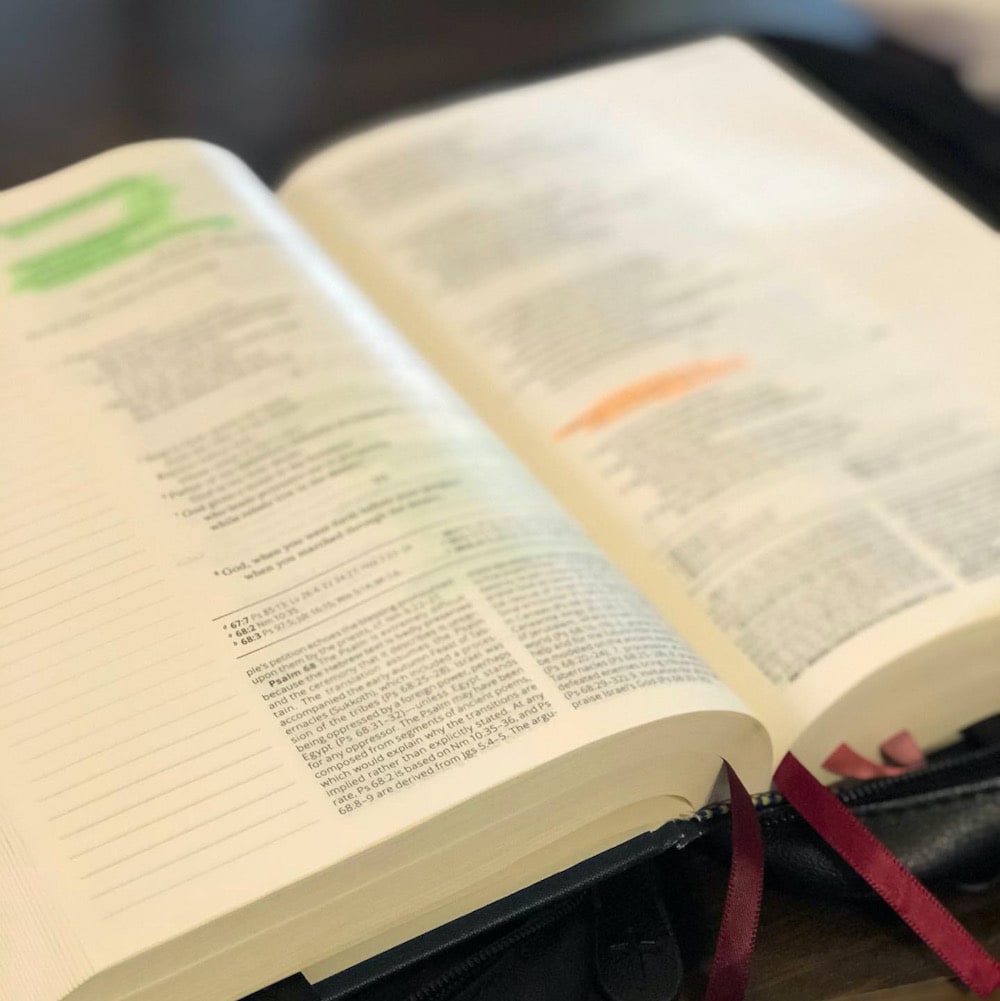
6. Keep your Bible open and accessible in your home.
I’ve written about this before. Your children need to see you in Scripture. You can’t live by a book that is sitting dusty on a shelf. If you want to see more about this, read my post about it called Keep Your Bible Open; Faith & Raising Kids.
7. Go to Confession once a month as a family.
Have a time where you go to the Sacrament of Reconciliation as a family on a consistent monthly or bi-monthly basis. Don’t miss this, it is so important. Getting our family’s in the habit of regularly confessing sins to God, becomes a life habit. As Catholics, the Church requires we do this at least 1 time a year, but strongly encourages more often than that.
Living in a state of burden from our sin is not the way Jesus intended. We need to hear we are forgiven. We are given the Sacrament of Reconciliation by Jesus so that we can be healed by Him through the in-persona Christi of the Priest. Not only is this important for your own soul but for the souls of your children.
When children are of age, usually around age 7, children do their first confession before receiving their first Holy Communion. At this age, they still cannot get in the car and go to confession by themselves, they need a parent to take them there. And it is a parent’s duty to make this available to their child once they are of age. Of course, a parent cannot “make” their child go to confession. But they can offer the opportunity on a regular basis, and help their children in the process of doing an examination of conscious.
Your children will also see that you need the Lord and that faith grows in adulthood. This is important because if we don’t continue to grow in our own faith walk, we will have a childlike understanding of it.
In the future, I will do an entire post just on this subject of confession because it is such a misunderstood topic in the church.
8. As a family, become friends with your Parish Priest(s) and local Religious Community Members.
There is much that could be said on this, but I want to focus on this aspect:
“They should encourage them in the vocation which is proper to each child, fostering with special care any religious vocation.” 169
Catechism of the Catholic Church
By parents forming a friendship with their Parish Priest(s) and Local Religious Communities, they give their children opportunity to explore what these vocations mean. Children get to grow up seeing the long haul picture and not just a snippet. I am very blessed that my son’s God Mother is a member of a Religious Community. If my son wants to know more about religious life, he has someone close to him that he can explore that vocation with and ask questions. If he feels a tug by the Lord toward the Priesthood, he will know his Parish Priest as a holy man of God but also as someone he has laughed and eaten meals with before. He will know that Priests and Religious are normal people that have been called by God into those vocations.
I don’t want to assume the call the Lord has on my son’s life. So, I will show him healthy marriages, holy Priests and pious Religious so that he can clearly discern his own call from the Lord.
9. Give up meat on Fridays all year (not just during Lent!).
This one is a bit complex to explain so I will try to explain it really simply.
The Church never removed the obligation to have an act of penance on Fridays all year (except for solemnities).
Previously, this act of penance this took the form of abstaining from meat on Fridays all year (except for solemnities). This was changed to the option of giving up something more personal. That it doesn’t have to be abstaining from meat but could be something else of the person’s choosing. But abstaining from meat is still a choice that is recommend and accepted as this act of penance.
If you want a deeper understanding of this, This article by National Catholic Register is great. It has all the references to Cannon Law and everything.
Catholics for a long time though have abstained from meat on Fridays, and my family does the same. It’s an act that links us to Catholics throughout history and is still recommended by the Church. It’s a way that sets us apart from the world, and reminds us of Christ’s sacrifice for us. It becomes a rhythm in life that children can understand.
Instead of eating meat on Fridays, it’s replaced with fish or vegetarian foods instead. Think basic foods, nothing too extravagant.
10. Hang religious art on your walls.
Have beautiful reminders of Christ throughout your home. They could be decorative written prayers, scenes from the Bible, etc.
In my home we have a painting of Jesus and a painting of The Last Supper hanging in our living room. We have Crucifixes throughout our home. Saint prayer cards on our refrigerator. Rosary beads hanging in prominent locations.
All of these things offer small ways to reflect on the Lord throughout the day. Of course, these are not needed to have a relationship with the Lord. But think of when others enter your home. Would they know a believer lives there? Maybe it could be a catalyst to start a conversation.
Children will also love being able to see Biblical stories come to life in art.
Want to see more on the subject of FAITH?
Or read more about FAMILY here
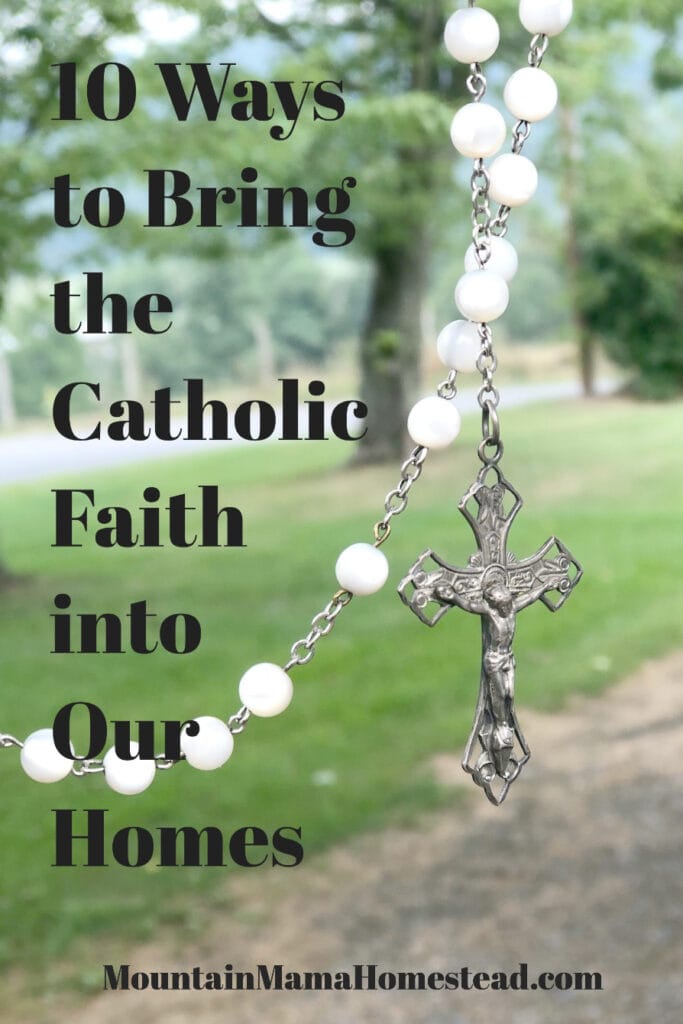
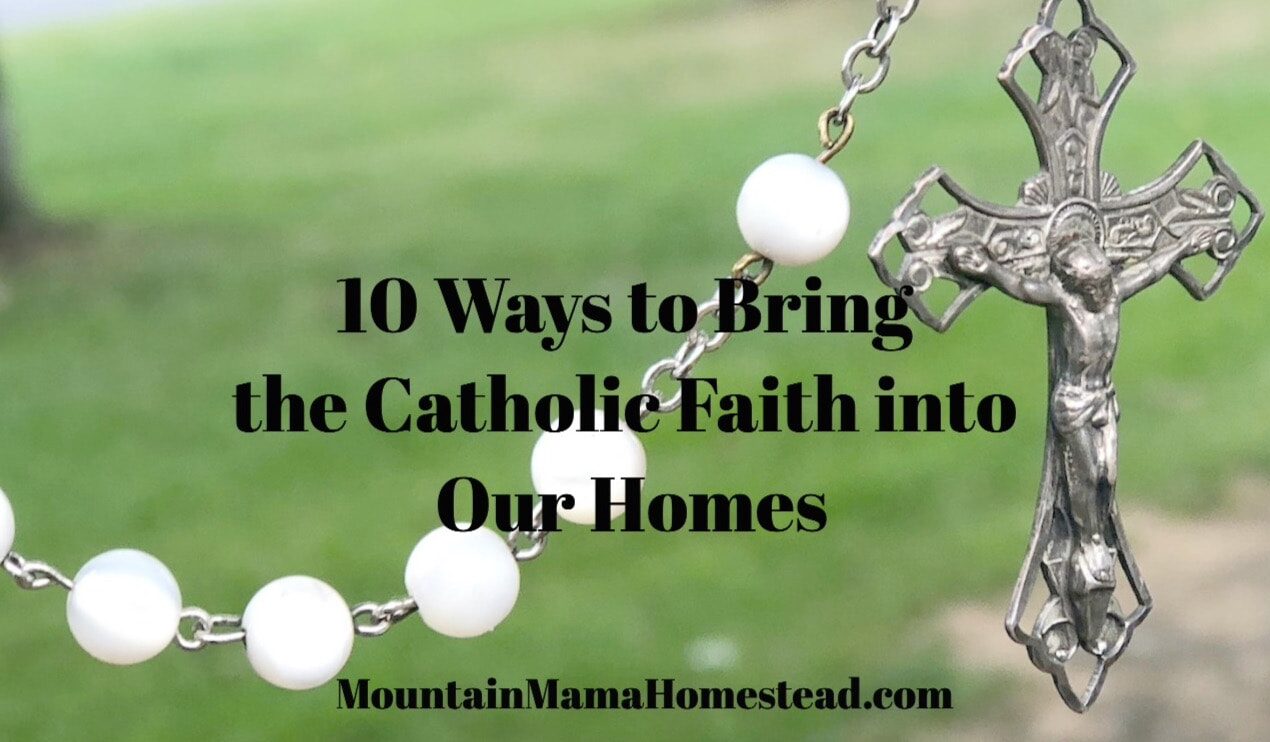
Nancy Brown
Love the. Especially the picture of little guy reaching for the holy water.
Mountain Mama
Thank you! It is one of my favorite pictures 🙂